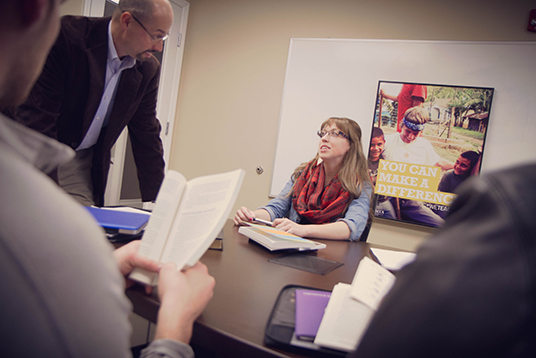Overview
"The Communication Studies Department is like a family. The professors care about their students more than just academically. What we learn in our classes are things we can use in everyday life."
Interpersonal Communication is the study of how people relate to each other in friendships, families, romance, church, and work. When you study interpersonal communication at Trevecca, you will learn about the development of listening, empathy, trust, influence, conflict management, verbal and nonverbal communication in a Christ-centered community. These skills help will help you become a stronger communicator in every aspect of your life.
What our students say
"My experience in Trevecca's Communications Department was more than I ever hoped for when I adopted my major. The first thing that drew me to the department were my conversations with Dr. Welch and her immense care for both my education and my well-being. The further I got into the program, the more I realized how Interpersonal Communications is so prevalent throughout our lives, and I learned how to utilize the knowledge in a 'real-world' setting. I also became more aware of the way that each professor loved and cared for their students. They created an educational community that was engaging, educational, and applicable, and they encouraged and supported me through every twist and turn. Having now graduated, I am able to say that I still have an incredible support system at Trevecca, use my major every day, and can see the things I learned in every interaction I have."
Brycellyn LaBorde ‘14
Executive Assistant to Christine Jones
(Arizona gubernatorial candidate)
Faculty
News
Core Classes
Interpersonal Communication
COM 2010
A study of two-person (dyadic) communication. Topics include: human communication theory, verbal and nonverbal codes, development of self-concept, perception, impression formation, and relationship development. Preferred prerequisite for all courses leading to an Interpersonal Communication major.
Course Hours: 3
Principles of Intercultural Communication
COM 2020
A study of how culture affects communication behavior and intercultural relationships. This course provides a broad theoretical and contextual base that emphasizes intercultural communication competency as it relates to Western and non-Western cultures.
Course Hours: 2
Practicum in Intercultural Communication
COM 2030
A field-based, experiential course structured to provide the student with skill development opportunities in intercultural community service or ministry. The course must be taken concurrent with or subsequent to COM 2020. May be repeated for a maximum of 3 credits.
Course Hours: 1
Small Group Communication
COM 2810
Involves the study of theory and research of communication behavior in small problem-solving groups. Includes the effects of participants' personal characteristics and of situational constraints involved in small group interaction.
Course Hours: 3
Theories of Communication
COM 3010
Surveys the major theories of human communication. The study will focus on the origins, usefulness, and limitations of each theory for understanding communication events. This course will help prepare students to analyze and interpret human communication in all its forms (intrapersonal communication, interpersonal communication, small group transactions, organizational communication, public speaking, drama, and mass communication).
Course Hours: 3
Language and Social Interaction
COM 3340
An examination of communication as symbolic interaction between human beings within social contexts. The social construction of interpersonal and societal meaning primarily through the use and influence of language is analyzed.
Course Hours: 3
Nonverbal Communication
COM 3500
A study of the nonverbal forms of human communication. Special attention is given to the creation of meaning through such nonverbal forms as facial expression, gesture, bodily movement, use of space and time, voice, and environmental setting.
Course Hours: 3
Advanced Public Speaking
COM 4000
Gives students practical experience in the preparation and presentation of the speeches that are usually required in business and the professions. Areas of instruction include speech making, oral reading of reports, and speech for radio and television.
Course Hours: 3
Social Influence
COM 4060
Examines the role of communication and human relations in the initiation of attitude change and development within individuals, groups, community organizations, and other cultures. Consideration will be given to persuasive theory, diffusion of innovations, conflict resolution, and the development of working relationships between and within community groups.
Course Hours: 3
Career Internship in Communication Studies
COM 4510
Intensive study, observation, and participation in various field projects designed and contracted between the student and instructor. Internships will be arranged in conjunction with the student's major. Supervision is coordinated with the Career Services Office. Maximum of 6 hours. Graded S/U.
Course Hours: 1-3
Research Methods in Communications Studies
COM 4550
Introduces students to the most commonly used qualitative and quantitative methods of research associated with the discipline of communication.
Course Hours: 3
Senior Project in Communication Studies
COM 4800
All majors in the Department of Communication Studies are required to present a senior project as a public performance. The project should relate to the student's specialized interest in the field, demonstrate his or her acquired skills, and be academically and vocationally beneficial as a culminative experience. The project must be approved by the faculty advisor at least one semester in advance. The number of credits is contingent upon the number of hours given to the project [40+ hours for one (1) credit; 80+ for two (2) credits.] Graded S/U.
Course Hours: 1-2
Overview
"The Communication Studies Department is like a family. The professors care about their students more than just academically. What we learn in our classes are things we can use in everyday life."
Interpersonal Communication is the study of how people relate to each other in friendships, families, romance, church, and work. When you study interpersonal communication at Trevecca, you will learn about the development of listening, empathy, trust, influence, conflict management, verbal and nonverbal communication in a Christ-centered community. These skills help will help you become a stronger communicator in every aspect of your life.
What our students say
"My experience in Trevecca's Communications Department was more than I ever hoped for when I adopted my major. The first thing that drew me to the department were my conversations with Dr. Welch and her immense care for both my education and my well-being. The further I got into the program, the more I realized how Interpersonal Communications is so prevalent throughout our lives, and I learned how to utilize the knowledge in a 'real-world' setting. I also became more aware of the way that each professor loved and cared for their students. They created an educational community that was engaging, educational, and applicable, and they encouraged and supported me through every twist and turn. Having now graduated, I am able to say that I still have an incredible support system at Trevecca, use my major every day, and can see the things I learned in every interaction I have."
Brycellyn LaBorde ‘14
Executive Assistant to Christine Jones
(Arizona gubernatorial candidate)



